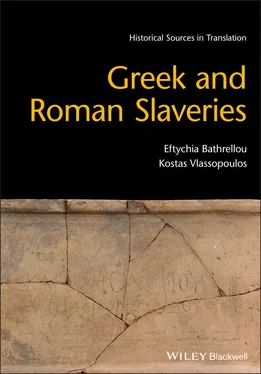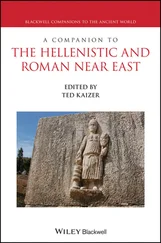Literature: Link 2001; D. M. Lewis 2013, 2018: 147–65; Gagarin and Perlman 2016: 345–50.
If he (i.e. a free man) rapes a free man or a free woman, he shall pay 100 staters. 28If he rapes an apetairos , 10 staters. If a doōlos rapes a free man or a free woman, he shall pay double. If a free man rapes a woikeus , whether male or female, he shall pay 5 drachmas. If a woikeus rapes a male or a female woikeus , he shall pay 5 staters.
What fines for rape does this law envisage?
What status terms are employed in this passage?
Do doōlos and woikeus both refer to slaves?
If they refer to different groups, are there provisions for the rape of woikeus by a doōlos? If not, why?
If doōlos and woikeus refer to the same group of people, how can we explain that both terms are used in the same passage?
What can we learn about the Greek vocabulary of slavery from this text?
2.7 Aeschines, Against Timarchos , 54–64: Greek Law-Court Speech, Athens (Mid-Fourth Century BCE)
In this lawsuit against the Athenian politician Timarchos of Sphettos, Aeschines accuses him of not being fit to be a politician because he had lived as a paid male escort and had dissipated his paternal inheritance (cf. 4.33). Athenian sources often refer to freedpersons as if they were still slaves; whether Pittalakos was still a slave when the events described here took place is a matter of debate.
Literature: Fisher 2001: 189–204, 357–62, 2008; Hunter 2006; Kamen 2009; Vlassopoulos 2009.
Among those who spent their time at that gambling house, there was one Pittalakos, a public-slave fellow, a servant of the city. He had plenty of money, and when he saw at the gambling house Timarchos here, he took him up and kept him at his home. And this foul man here did not at all feel ill at ease that he was going to disgrace himself before a public slave, a servant of the city. The only thing he looked to was if he would get a sponsor for his repugnant habits; never did he give a thought to what is fine or most shameful. […]
At the time when this man was living with Pittalakos, here comes Hegesandros, 29sailing down from the Hellespont. And I know well you have long been wondering why I have not mentioned him; so well known is what I am going to say. This Hegesandros – whom you know better than I do – arrives. It so happened at the time that, having sailed to the Hellespont as treasurer together with Timomachos of Acharnai, who had been general, he returned here, having made very good use, as word has it, of Timomachos’ naivety – with no less than 80 minai of silver. And in a way he was greatly responsible for Timomachos’ misfortune. With plenty to spend, he hung out at Pittalakos’ – they used to play dice together – and this is where he first saw Timarchos. He liked him, desired him, wished to take him up, to his house – in a way, he thought him to be of a nature similar to his own. First he talked to Pittalakos and asked him to hand Timarchos over to him. As he could not convince him, he approached the man himself. He didn’t need to waste many words; Timarchos agreed immediately. For even in the … business itself, his wickedness and untrustworthiness were terrible – so he should naturally be despised because of these things too.
When Timarchos had got rid of Pittalakos and been taken up by Hegesandros, Pittalakos was, I believe, suffering, as he thought that he had wasted so much money in vain, and was full of jealousy at what was going on. He would spend much time at their house. When he was getting to be a nuisance, behold the great might of Hegesandros and Timarchos! On one occasion, they and some others, whose names I do not wish to mention, got drunk and at night burst into the house where Pittalakos lived. First they started to smash his instruments and throw them out to the street – some shaken knucklebones and dice boxes and other dicing equipment; then they killed the quails and cocks the wretched man loved; in the end, they tied Pittalakos himself onto the pillar and kept whipping him relentlessly for so long that even the neighbors heard his cries.
The following day, Pittalakos, utterly indignant at this, goes to the marketplace naked and sits down at the altar of the Mother of the gods. A crowd quickly gathered, as was usual, and Hegesandros and Timarchos feared that their repulsive conduct might be proclaimed to the whole city – an assembly gathering was about to take place. They run to the altar – they and some of their dicing companions. They stood around Pittalakos and were begging him to rise from the altar, saying that the whole thing had been a drunken brawl. And this very one here – back then, he was not, by Zeus, as unpleasant to look at as he is now, but still quite decent – was touching the man’s chin in supplication, saying he would do anything he would like him to. Finally, they convince him to rise from the altar, so as to receive some portion of what was just. But once he left the marketplace, they paid no more attention to him.
Aggrieved at this outrage, the fellow brought legal actions against the two men. But when this was coming to trial, behold another instance of Hegesandros’ great might! A man who had not wronged him in anything but, on the contrary, had been wronged by him, a man who was nothing to him but was a public slave, a servant of the city – such a man did Hegesandros try to lead away to slavery, claiming he belonged to him. Pittalakos, now in extreme danger, appeals to a man, and indeed a very decent one. There is one Glaukon of Cholargos; he removes Pittalakos back into freedom. After this, legal actions were lodged. With time, they handed the case over for arbitration to Diopeithes of Sounion, who was of the same deme as Hegesandros and had had at some point relations with him, when in his prime. After Diopeithes undertook the case, he kept putting it off time after time, doing a favor to Hegesandros and Timarchos. But when Hegesandros started to appear on your rostrum and was fighting his war against Aristophon of Azenia – that is, before Aristophon threatened him with making before the assembly the same formal accusation I am making against Timarchos – and his brother Hair-bun was one of the regular speakers in the assembly, and in general they had the nerve to be offering you counsel over your relations with other Greek cities, at that time Pittalakos lost confidence in himself, took a good look at who he was and what men he was opposing, and made a correct decision – for the truth must be told: he held his peace and decided to be contented if he should not suffer any further trouble. So, it was then that Hegesandros, who had won this… fine victory without a fight, kept Timarchos here at his house.
Who is Pittalakos? What do we hear about his professional activities and possessions?
What conclusions about sexual relations between free and slave can we draw from the sexual relationship between Pittalakos and Timarchos?
How does Pittalakos attempt to redress the assault against him? How does he involve the free community and his citizen acquaintances in his conflict with Timarchos and Hegesandros?
How does Hegesandros try to stop Pittalakos’ legal challenge? What do you think about his claim?
Is Pittalakos still a public slave when these incidents take place? If yes, is there anything remarkable about his story?
If Pittalakos is no longer a public slave, why is he described as if he were?
What is Aeschines’ agenda in telling this story?
What conclusions should we draw about establishing and challenging status in classical Athens?
2.8 CIL VI, 12366: Latin Funerary Inscription, Rome (Second Century CE)
In the Roman world, while slaves were referred to by their own names, accompanied by their master’s name in the genitive, freedmen and freedwomen tended to use a name with three or two parts respectively, following the practice of Roman citizens. For the first elements, freedmen usually adopted their patron’s praenomen and nomen , while freedwomen their patron’s nomen ; as their name’s last element, freed persons kept the name by which they were known when they were slaves. Cf. 12.29. The names Agapete, Agapetus, Elpis, Philete, and Bostrychus are Greek and are often borne by Roman slaves and freedmen.
Читать дальше












